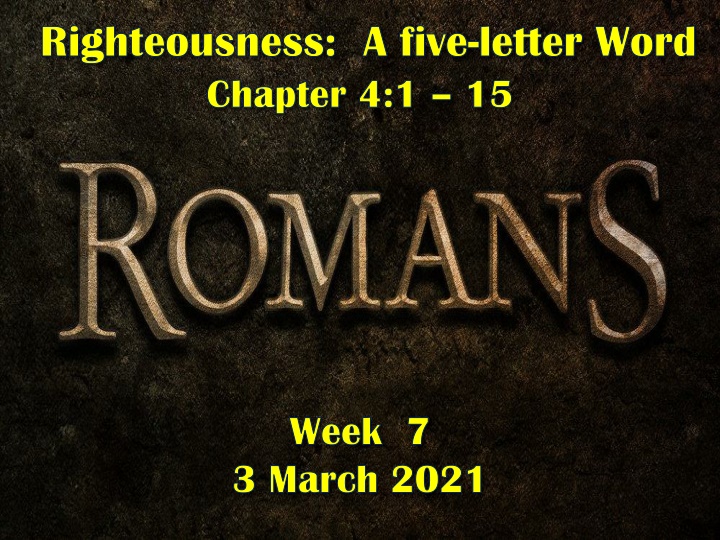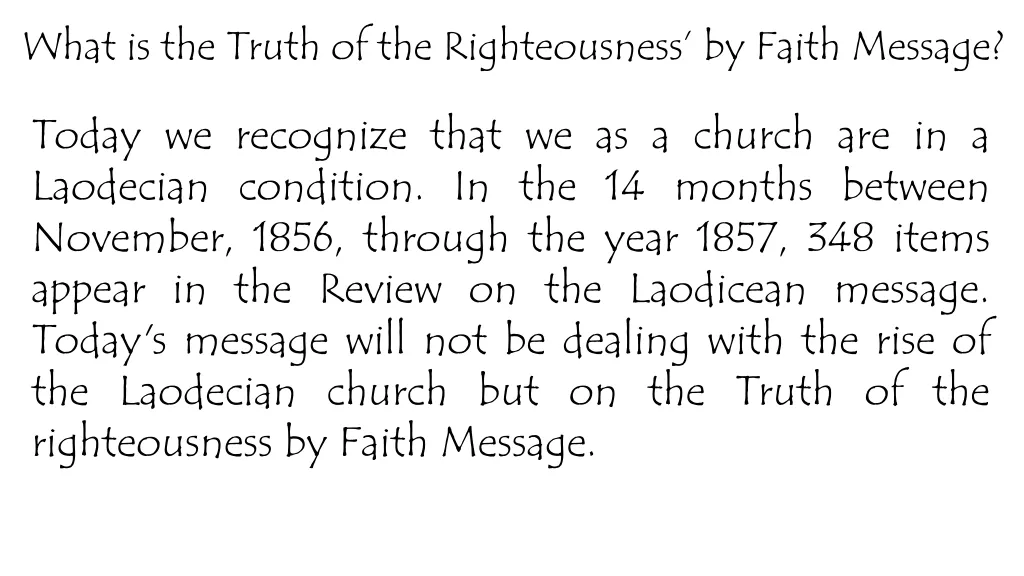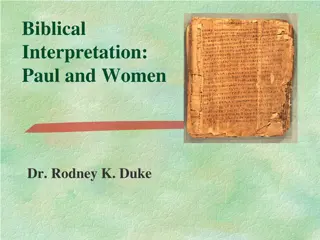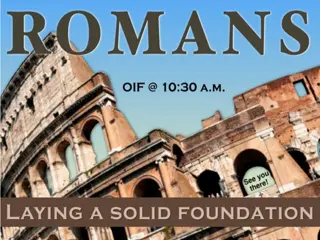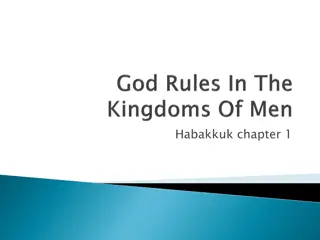Righteousness Through Paul's Teaching in Romans 4:1-15
Paul delves into the concept of righteousness in Romans 4:1-15, challenging the notion that one can achieve righteousness through works alone. He draws upon the examples of Abraham and circumcision to illustrate that justification comes through faith, not just adherence to laws and rituals. This passage serves as a cornerstone in highlighting the importance of grace and faith in the Christian faith, bridging the gap between Jewish tradition and the new covenant offered through Jesus Christ.
Download Presentation

Please find below an Image/Link to download the presentation.
The content on the website is provided AS IS for your information and personal use only. It may not be sold, licensed, or shared on other websites without obtaining consent from the author.If you encounter any issues during the download, it is possible that the publisher has removed the file from their server.
You are allowed to download the files provided on this website for personal or commercial use, subject to the condition that they are used lawfully. All files are the property of their respective owners.
The content on the website is provided AS IS for your information and personal use only. It may not be sold, licensed, or shared on other websites without obtaining consent from the author.
E N D
Presentation Transcript
Righteousness: A five Righteousness: A five- -letter Word Chapter 4:1 Chapter 4:1 15 letter Word 15 Week 7 Week 7 3 March 2021 3 March 2021
Jesus Christ Jesus Christ The Gift of Grace
ROMANS 4:1 15 Overview: Righteousness is a five-letter Word Many taught that Christianity was merely a continuation of the Jewish pursuit of spending one s life trying to achieve the righteousness of God by carefully obeying His laws and meticulously observingHis rituals. That Christianity was merely a new life made possible by the atonement of Christ, which one joined by following Him in obedience to the Father.
ROMANS 4:1 15 Overview: Righteousness is a five-letter Word So Paul s declaration, A [person] is justified by faithapart from works of the Law (3:28), sounded like a radically new doctrine, especially to Jewish believers. To demonstrate that the doctrine of justification by grace through faith was not new at all, Paul drew upon two familiar icons of Jewish faith and practice: Abraham (4:1-8) and the rite of circumcision (4:9-12).
ROMANS 4:1 2 Paul continues his argument . . . 1What then shall we say that Abraham, our forefather according to the flesh, discovered in this matter? 2If, in fact, Abraham was justified by works, he had something to boast about but not before God.
ROMANS 4:1 2 As Americans, we draw upon the examples of our founding fathers: George Washington, Benjamin Franklin, and Thomas Jefferson. Similarly, Jews would look all the way back to father Abraham, the physical progenitor of the Hebrew race through his son Isaac and grandson Jacob. If an honest examination of his life revealed a man justified by obedience to the laws and rituals handed down by God, then all who desire the righteousness of God should follow his example.
ROMANS 4:1 2 After all, Abraham was the physical and spiritual fatherof God s specially chosen nation. Paul then posed a hypothetical condition he knew to be false but assumed to be true for the sake of examination: If Abraham was justified by works that is, if Abraham could be considered righteous because of what he did then Abraham had the right to praise (boast) about his own accomplishments.
ROMANS 4:1 2 The Rabbis taught that Abraham had a surplus of merit for his works that was available to his descendants. Paul built on this idea . . . Assuming that Abraham wasby works, he had something to boast or brag about. But, Paul insisted, his boasting could only be before other people, not before God. Even so, Paul recoiled from the idea. He could barely tolerate the suggestion that anyone could earn his or her own righteousness through deeds.
ROMANS 4:3 Righteousness is through faith . . . 3What does Scripture say? Abraham believed God, and it was credited to him as righteousness.
ROMANS 4:3 Rather than dwell on the preposterous notion that anyone even Abraham could earn his or her own righteousness, Paul quotes Scripture, Genesis 15:6 as the foundation of his argument: Then Abraham believed in the Lord, and He reckoned it to him as righteousness. Because Abraham believed, God imputed righteousness to his account ( credited, an accounting term).
ROMANS 4:4 5 Righteousness is through faith . . . 4Now to the one who works, wages are not credited as a gift but as an obligation. 5However, to the one who does not work but trusts God who justifies the ungodly, their faith is credited as righteousness.
ROMANS 4:4 5 Paul then discussed the significance of this Scripture quotation. He points out that a worker s wages are what are owed him because he earned them, and are not graciously given to him as a gift. Conversely, a person who is not working but is believing on God who justifies the wicked (the ungodly, impious), her or his faith is credited as righteousness. Abraham was justified not because he worked for it, but because he trusted God.
ROMANS 4:6 8 6 Whom David says the same thing when he speaks of the blessedness of the one to whom God credits righteousness apart from works: 7 Blessed are those whose transgressions are forgiven, whose sins are covered. 8Blessed is the one whose sin the Lord will never count (impute) against them.
ROMANS 4:6 8 This fact about Abraham was also true of David. Here, Paul describes God s gracious dealing with David by quoting from Psalm 32:1-2: Blessed is he whose transgression is forgiven, whose sin is covered. 2Blessed is the man unto whom the Lord imputes not iniquity, and in whose spirit there is no guile. Through faith, God addresses the problem of sin and depravity. However, our transformation is not instantaneous. We will continue to struggle with sin and failure until we die.
ROMANS 4:6 8 We must carefully distinguish between one s position (state) and one s condition (stand). When one receives God s grace through faith, he or she is considered righteous and treated as such despite his or her current behavior. POSITION (state): Imagine a prisoner locked in a cell whose sentence has been commuted. Judicially and legally he is free . . . CONDITION (stand): Currently and experientially he remains confined. Eventually, his experience will match his judicial state.
IMPUTATION Grace STATE STAND Faith
ROMANS 4:6 8 Like David, a person to whom God credits righteousness, apart from works, is blessed. Such a person s sins are forgiven and covered. And instead of his sin credited (imputed) to his account, God credits (imputes) righteousness to him. By the sovereign act of God, the unjust person who receives His grace through belief is declared just.
ROMANS 4:9 12 9 Is this blessedness only for the circumcised, or also for the uncircumcised? We have been saying that Abraham s faith was credited to him as righteousness. 10Under what circumstances was it credited? Was it after he was circumcised, or before? It was not after, but before! 11And he received circumcision as a sign, a seal of the righteousness that he had by faith while he was still uncircumcised. So then, he is the father of all who believe but have not been circumcised, in order that righteousness might be credited to them. 12And he is then also the father of the circumcised who not only are circumcised but who also follow in the footsteps of the faith that our father Abraham had before he was circumcised.
ROMANS 4:9 12 Paul again raises the questionof the Jews special position. The way the question is worded in the Greek suggests the answer, that this blessedness is for the uncircumcised (Gentiles) as well as for the circumcised (Jews). But in response, Paul turns again to the example of Abraham. Paul repeats the authoritative scriptural declaration that Abraham was declared righteous on the basis of his faith. Then Paul asked whether Abraham s justification occurred beforeor after he was circumcised.
ROMANS 4:9 12 Answering his own question, Paul stated, It was not after, but before. Abraham s age when he was declared righteous (Gen. 15:6) is not stated. But later when Hagar bore him Ishmael, he was 86 (Gen. 16:16). After that, God instructed Abraham to perform the rite of circumcision on all his male descendants as a sign(or seal) of God s covenant with Him; at this time Abraham was 99 years old (Gen. 17:24). Therefore the circumcision of Abraham followed his justification by faith by more than 13 years.
ROMANS 4:9 12 Through the centuries after Abraham, God s covenant people placed greater and greater emphasis on the outward symbol of circumcision and virtually forgot the internal spiritual significance of their relationship with God. Like circumcision, baptism and Communion are meaningless apart from a relationship between Jesus Christ the individual. So, Paul needed to clarify the original purpose for circumcision to demonstrate that participation in God s covenant is a matter of the heart.
ROMANS 4:9 12 Because Abraham believed and received the righteousness of God years before he was circumcised, Paul called him the father of all who believe, both circumcised and uncircumcised. Many non-Hebrew men and women have received God s grace through faith, and many circumcised Hebrews have trusted in the outward symbols of faith not centered in Christ. Therefore, Abraham s faith gave him the role of patriarch over the family of genuine believers.
ROMANS 4:13 15 13It was not through the law that Abraham and his offspring received the promise that he would be heir of the world, but through the righteousness that comes by faith. 14For if those who depend on the law are heirs, faith means nothing and the promise is worthless, 15because the law brings wrath. And where there is no law there is no transgression.
ROMANS 4:13 15 Paul comes full circle to conclude his argument, reiterating his point from 4:4-5. Contrary to most common misunderstanding of God s expectation of humankind, we cannot be declared righteous through obedience to His Law. (Please reread!) If it were possible to be declared righteous through perfect obedience, there would be no need for God sgrace. In reality, though, we have no hope apart from the grace of God because no one can earn the title righteous through good deeds.
ROMANS 4:13 15 Even if we were to obey perfectly from this moment on, futurerighteousness cannot erase pastsin. Why, then, did God give us His Law? Not to suggest we can be saved by it. Far from it! He gave us the Law to make our disobedience obvious, to demonstrate how our fallen, sinful nature runs contrary to His. Anyone who believes that the Law was given as a means for people to prove their worth will soon be frustrated and ultimately fall into despair.
ROMANS 4:13 15 The Law was given to expose sin. Therefore, where there is no law, there is no sin. Anyone who expects to be declared righteous through obedience to the Law will experience repeated failure. Our only hope is to receive the righteousness of God as a giftby believing God s promise. Righteousness is really a five-letter word. You spell it F-A-I-T-H.
NEXT CLASS 3 March 2021 Before next class, read the below chapter in the Before next class, read the below chapter in the KJV and in one other versions of the Bible, i.e., KJV and in one other versions of the Bible, i.e., NKJV, NRSV, NIV, CEV, etc NKJV, NRSV, NIV, CEV, etc Reread the Chapter 4 and 5 Focus on verses 4:16 25
